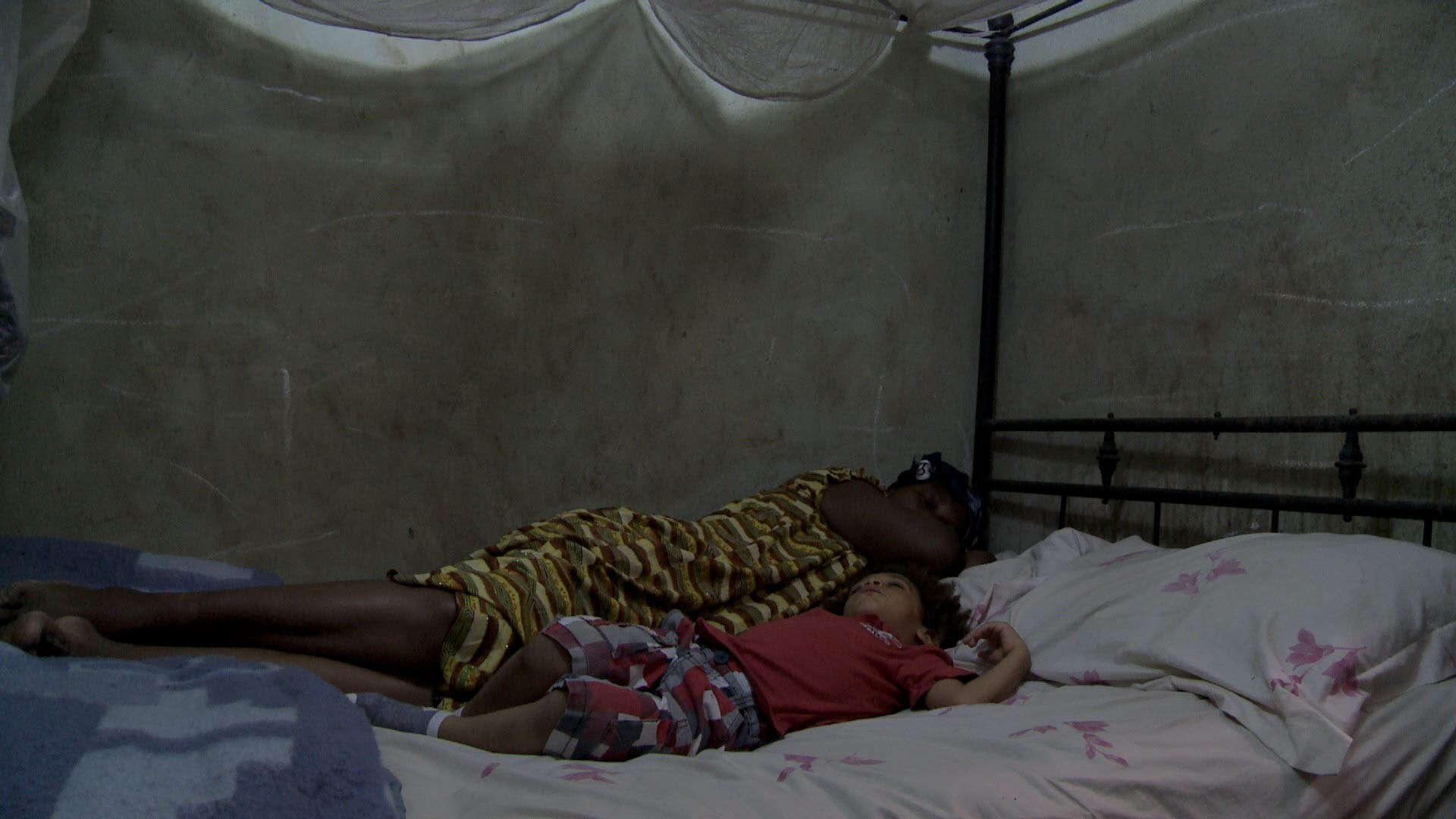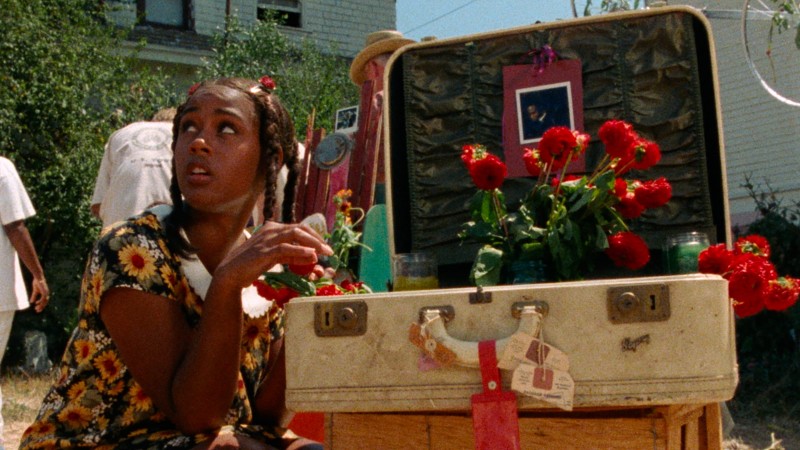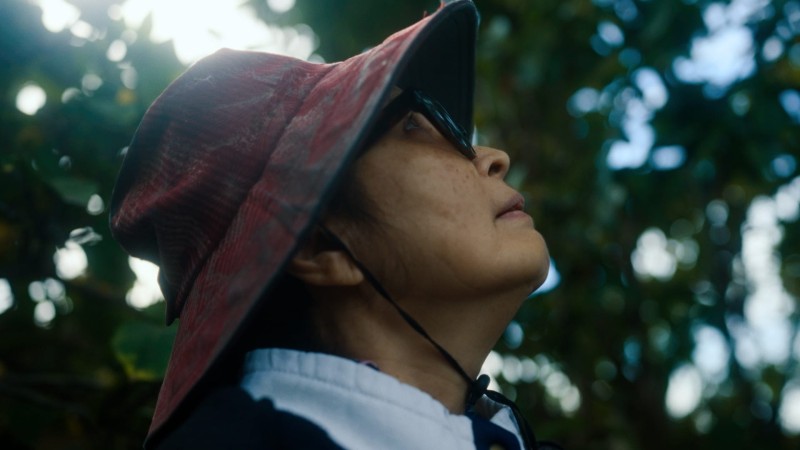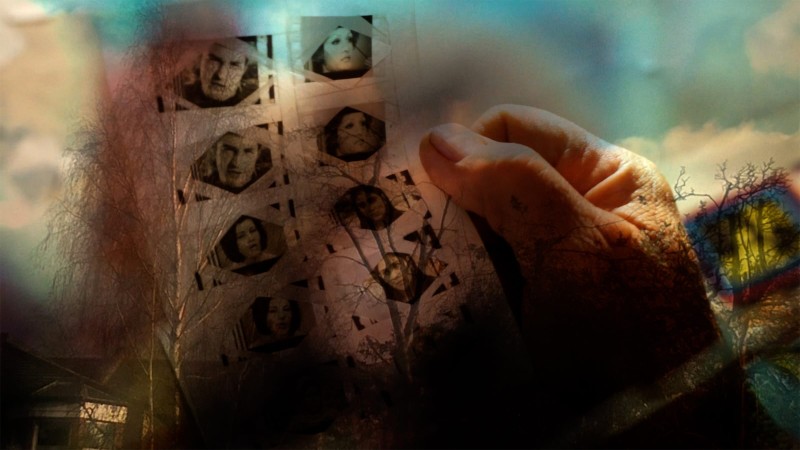Unfinished Stories: A Conversation with Rosine Mbakam

Rosine Mbakam’s documentaries are exercises in reconfiguring relations of power. Her first three nonfiction features are all portraits of Cameroonian women, each of whom is invited to participate in coconstructing a cinematic space of testimony, candor, and expressive autonomy. Filmed in Yaoundé, Douala, and Tonga, The Two Faces of a Bamiléké Woman (2018) is structured around a series of intimate exchanges between the filmmaker and her mother, Mâ Brêh, whose patience, self-reliance, and knowledge anchor the film. An embodiment of women’s popular memory, Mâ Brêh speaks about everything from the brutalities of French soldiers under colonialism to how to care for the body after birth, while also offering a glimpse of the activities of a women’s collective. Framed by Mbakam’s return to Cameroon with her son in tow, the film is an elegant weaving together of history and remembrance at the personal, familial, and national levels.
Mbakam’s next two films, Chez Jolie Coiffure (2018) and Delphine’s Prayers (2021)—set in the small spaces of a hair salon and a bedroom—are studies in seeing women who are visible and valued in their worlds, even if systematically excluded from dominant narratives. Energetic and full of magisterial charm, Sabine runs the salon that comprises Chez Jolie Coiffure’s entire physical setting. She deftly maneuvers around the cramped space: braiding, offering advice and admonition, managing a range of problems. Sabine acts as a centrifugal force and acute commentator, relating her own harrowing trajectory navigating the cruelties of European migration policies while also exemplifying the underground forms of care that make survival possible. By contrast, Delphine is filmed in the privacy of her bedroom. Passionate and perceptive, she transforms the space into a stage for a verbal memoir, sharing the sexual trauma and violence that shadowed her journey from Cameroon to Belgium in a heart-wrenching exposition, which reveals a degree of resilience that should never have been asked of her. In these two documentaries, Mbakam’s methods of patiently building trust and intimacy foreground the self-determination of their protagonists. These films all unfurl through conversation, assembled from ongoing exchanges, with only the lightest guidance from the director’s noninvasive questioning. Fundamentally, Mbakam sees cinema as an active social relation.
Now based in Belgium, Mbakam began her practice working in TV in Cameroon, after which she continued her training at the film school INSAS in Brussels. It was there that she chose to pursue a type of documentary filmmaking that would labor against both the form’s racist, colonialist beginnings in ethnography and the continued philanthropic paternalism of Western renderings of the African continent and its peoples. With a perspective conditioned by openness and generous curiosity, Mbakam mounts a thoughtful, careful assault on the colonial gaze. Mbakam founded Tândor Productions with Geoffroy Cernaix in 2014 and expanded the company to Cameroon in 2018, with the addition of Caravane Cinéma, a mobile infrastructure that tours around the region. Materializing a commitment to film as a collective and accessible activity, Caravane Cinéma shows African films where they might not screen otherwise, contextualizing the screenings with workshops and discussions. In both her films and her related projects, Mbakam prioritizes catalyzing a dialogue with her audiences and a participatory process that seeks to demystify the art form and integrate it into public life.
Mbakam’s films have won multiple awards and been shown at numerous international festivals, including the New York African Film Festival (2018), the International Film Festival Rotterdam (2018), the West African Film Festival (2018), MoMA’s Doc Fortnight (2021), True/False Film Festival (2021), and IndieLisboa (2021), as well as in theatrical runs, such as the retrospective Prisms and Portraits: The Films of Rosine Mbakam, which played at the Brooklyn Academy of Music in 2021 to accompany her latest work, the collaboratively made Prism (2021). The Two Faces of a Bamiléké Woman, Chez Jolie Coiffure, and Delphine’s Prayers are now available on the Criterion Channel.






